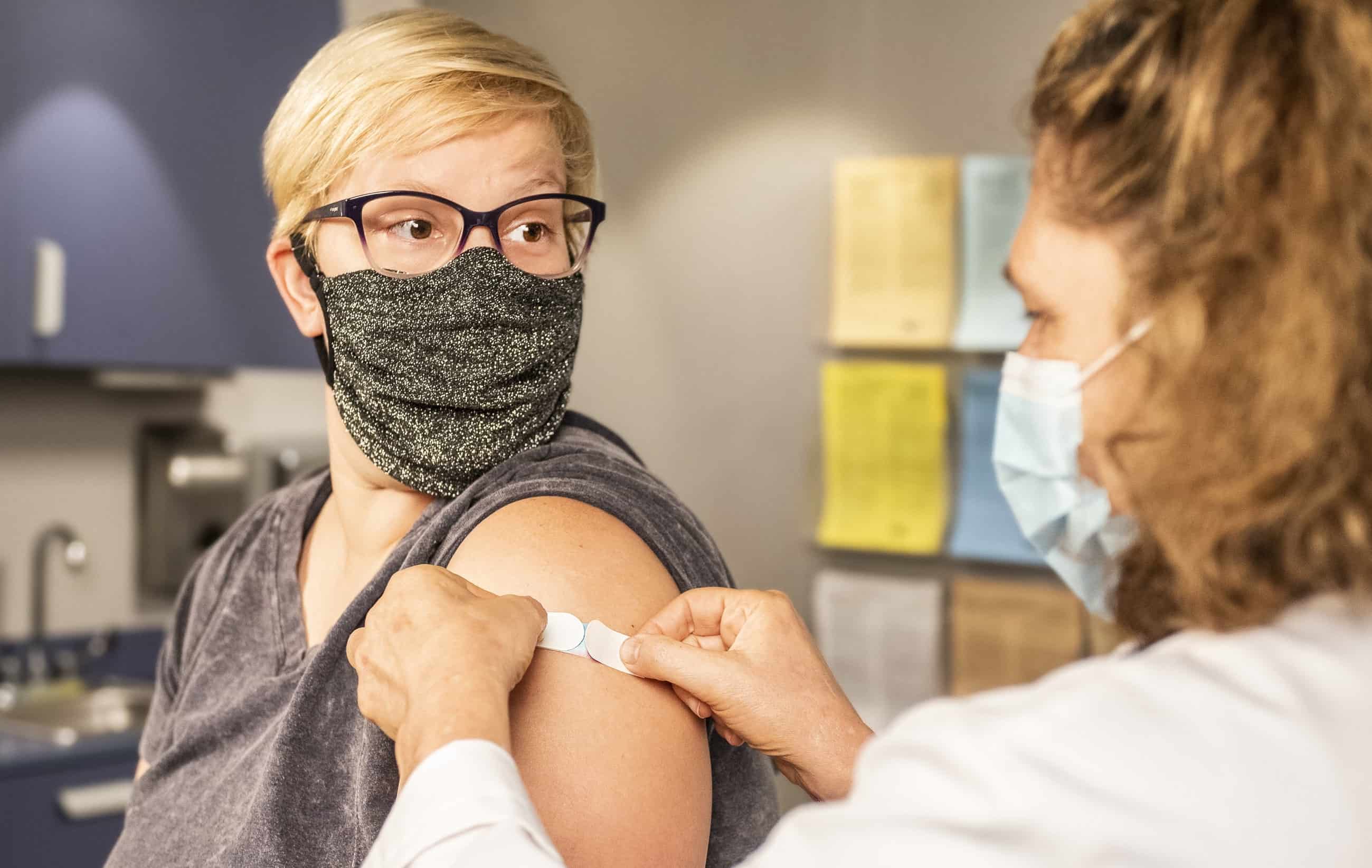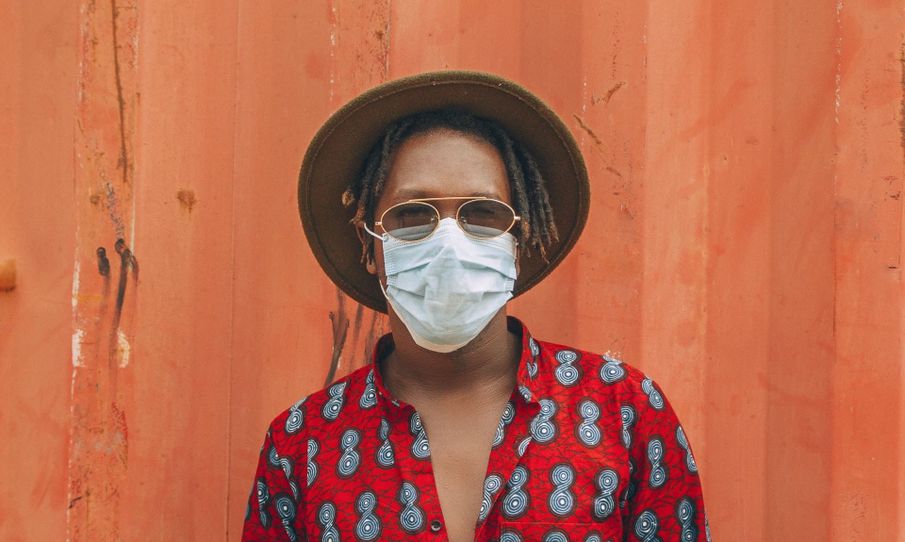At the beginning of 2020 it was inconceivable that we’d all be wearing face masks and now there’s a huge divide in opinion after the announcement that soon they'll no longer be compulsory. But is continuing to wear a mask an act of collective community care?
Face masks have become an everyday necessity here in the UK. Whether we’re heading to the shops, taking public transport or meeting a friend for a coffee, a large proportion of us will be sporting a mask, and we now automatically check for keys, wallet, phone and our face masks when leaving the house.
On Monday 5 July, Prime Minister Boris Johnson announced a number of possible upcoming changes to the way we currently live our lives. If the next phase of restriction easing goes ahead as planned, he shared, then face masks will no longer be compulsory in public spaces and wearing them will be personal choice.
The majority of Britons say face masks should continue to be mandatory on both public transport (71%), as well as in shops and some enclosed public spaces (66%) beyond when restrictions are liftedhttps://t.co/hlpfOq16kg pic.twitter.com/hxva59kEiC
— YouGov (@YouGov) July 5, 2021
The wearing of face masks and how we move forward is widely debated and opinion is clearly divided. Some people are frightened as to how this might impact their health, others wish to protect the wider community by continuing to wear them and some have stated that the rhetoric around face masks and Covid is government manipulation. There are many, many different opinions along the mask deabate spectrum, ranging from fear to denial.
Managing Anxiety
What is undeniable though, is that some people have concrete concerns about changes to the use of face masks, and that anxiety is very real and valid.
“The pandemic has caused anxiety to rise to unprecedented levels. People have suffered more from health related anxiety and general anxiety around change and uncertainty and now, as we begin to see an ease in restrictions, cases of social anxiety as we re-enter our social lives are also becoming an issue,” Psychotherapist and Counselling Directory Member Kirsty Taylor explains.
It makes me nervous. The masks protect other people, NOT the wearer and it worries me that people seem to have given up feelings of concern about those around them. I will still wear a mask in shops for the foreseeable future. I want to protect those around me.
— Jessica V Lane (@JessicaVLane) July 7, 2021
“The announcement that face masks will be optional may well cause a huge spike in anxiety for individuals,” she continues. “It might feel hard to remember our lives before lockdown and a return to living as we used to might cause all sorts of issues with the lack of control and uncertainties of the future that we now need to navigate. It is quite normal to feel overwhelmed by this recent news as we move into uncharted territory.
Kirsty recommends that anyone experiencing anxiety can manage how they interact with the world, in order to acclimatise to the upcoming changes. “It’s important to take things at your own pace. There is no requirement to completely get rid of wearing a mask, so it might be useful to spend a small amount of time in public places with your mask off (if that’s possible for you) and gradually increase this at a pace that feels comfortable.
If the anxiety feels too great, it’s also ok to keep wearing your mask for as long as you want to
“It’s important to expose ourselves to our own anxieties in small and measured ways, to begin to build evidence that we are ok and that will come to no harm. If the anxiety feels too great, it’s also ok to keep wearing your mask for as long as you want to.
“However, if an individual feels their anxiety is becoming a problem, if sleep or social life is affected over a prolonged time, then it might be useful to talk to a professional,” Kirsty acknowledges. “The key to gradually getting used to this new world we are about to experience is to do it gradually, safely, with people you trust and at a pace that suits you.”
Sources of anxiety
Happiful wanted to know more about the concerns of our readers in response to face mask changes, so we reached out to our Reader’s Panel and also requested thoughts via Twitter.
A number of themes emerged throughout the comments posted, including the perceived lack of respect for people anxious about the change, those with chronic illness and those who are immunosuppressed.
Happiful reader Elaine outlined her concerns, both in terms of her own anxiety and how we relate to each other in society. “I will definitely still be wearing my mask,” she wrote. “I’m saddened though by the divisions this move seems to have caused.
“I’m thrilled for people who are excited at the new easing of restrictions and wish them well, but there seems to be less mutual respect and empathy for those of us who are still anxious about things opening up.”
Louise echoed Elaine’s anxiety and the need for greater understanding that not everyone will experience the change to restrictions in the same way.
I just wish that TV programmes would include information on the need to continue to protect people who are more vulnerable, and to be kind
“This scares me so much,” she shared. “There is no mention of the need to help protect the immunosuppressed, for whom the vaccine seems to be less effective. It appears that the only way I’ll be safe is not to go out again.
“I just wish that when TV programmes are discussing the lifting of restrictions, that they’d include information on the need to continue to protect people who are more vulnerable and to be kind.”
A collective act of community care?
The need for empathy and a wider understanding of how the changes might impact others, extends to those working in public facing roles. From teachers to transport workers, shop staff, members of the NHS and emergency services, and many more besides - they all deserve our respect and consideration.
People working in these roles have not had the same opportunities to work from home and stay away from others over the past eighteen months. As a result they’ve been exposed to every wave and societal change Covid has brought with it. Now they’re facing the prospect of having to perform their jobs whilst repeatedly coming into contact with members of the public who are choosing not to wear masks.
“As a health professional specialising in chronic illness I wish people understood that mask wearing protects others more than yourself
A number of frontline workers commented about the possible changes. Their general feedback suggested that continuing to wear a mask indoors and within highly populated environments is something we can proactively do in order to support ourselves and everyone who is likely to be significantly impacted by the virus.
“As a health professional specialising in chronic illness I wish people understood that mask wearing protects others more than yourself," Elizabeth wrote. "To not wear one indoors in busy places shows either ignorance or lack of care about other people’s vulnerabilities.”

The vaccine roll out continues
The e-biker gardener (Twitter name), offered his belief that we need to remain cautious and consider wearing a mask when out in public as a safeguard. “I’m an ex-respiratory officer for the fire service,” he shared. “I’ll be moving my respiratory protection up to an FFP3 mask and avoiding crowded places, unless it’s just briefly. Time, distance, and shielding is a good mantra to keep yourself safe in the coming months.”
Just because face masks are no longer compulsory, does not mean we no longer wear face masks
Reminding us that the change in restrictions does not have to mean the end of responsible mask wearing, James Charles added.“Just because face masks are no longer compulsory, does not mean we no longer wear face masks. From my experience as a union rep, compulsory safety legislation was needed for employers and businesses to make workplaces and premises safe.”
Personal choice
While the choice to wear or not to wear a mask in busy and indoor environments will be a personal one come 19 July, the wider impact of choosing not to wear a mask in public places is worth taking into consideration.
The thing with #COVID precautions is that it’s not just about individual rights, but collective responsibility too.
— Ranj Singh (@DrRanj) July 5, 2021
I’ll continue to be cautious if it’s required, if I feel safer, or if it helps those around me feel safer.
Be considerate of those who aren’t able to just stop x
Much work is still to be done around how we protect people who are immunosuppressed, vulnerable and living with chronic illnesses and we hope that they’ll be fully acknowledged and supported in the coming weeks.
We also hope that the amazing sense of community-mindedness we witnessed in the first wave re-emerges as we move out of current restrictions, and that we ALL remember to be kind and look out for others.
To find the right therapist for your needs, visit Counselling Directory


Comments